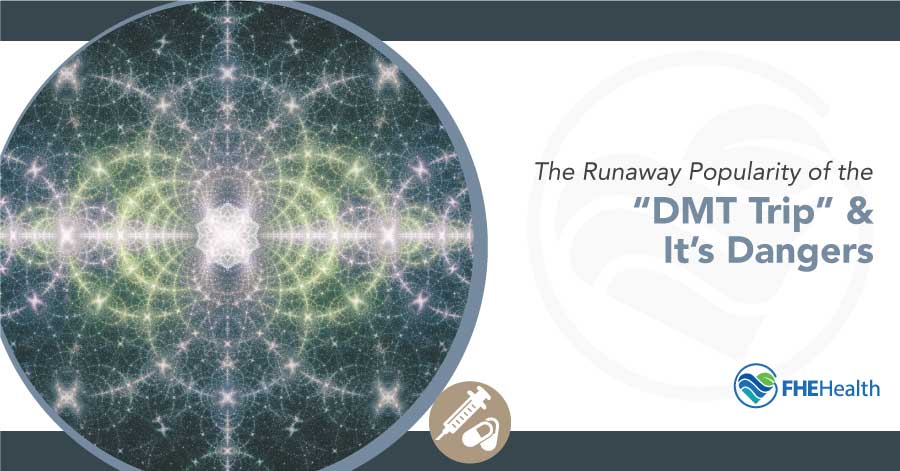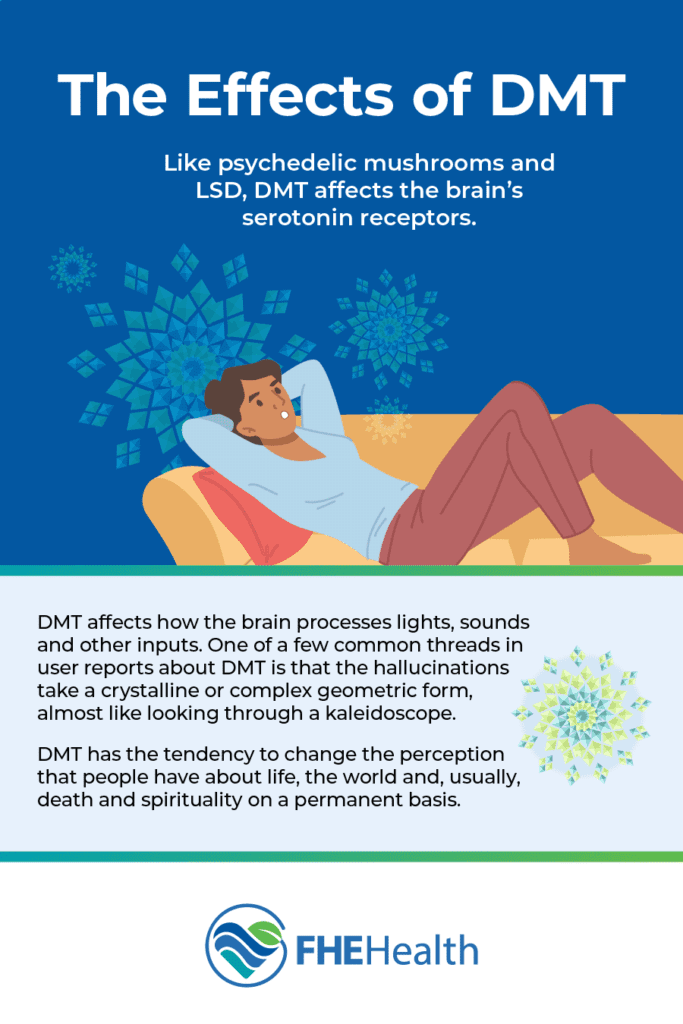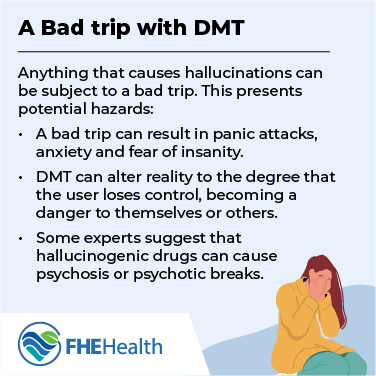
Psychedelics are inherently different than other illicit and addictive substances because of how they gain traction. While drugs like alcohol and heroin are often used to escape reality and stimulants like cocaine are used to boost the experience of a party, LSD, psilocybin mushrooms and the latest addition to the group, DMT, have always been looked at a little differently.
First, they aren’t addictive in a classical sense. You can easily become addicted to the effects they cause, but these substances aren’t addictive in the same way heroin, cocaine and alcohol are addictive. They’re also used in more of a transcendental way than other drugs. People use these drugs to have “experiences” — it’s even thought that indigenous people used these same substances to go on vision quests and have religious experiences. Because of these factors, psychedelics are not subject to the same stigma as other drugs.
As the popularity of DMT continues to grow, though, maybe we should consider the fact that there are dangers to this class of drugs. In this piece, we’ll talk about DMT with the aim of uncovering the dangers of abusing it.
The Immense Popularity of DMT
 The number of people in the population who have used DMT is growing rapidly. In 2008, a study published in the American Journal of Addiction found that 0.2% of the population was using DMT. In 2014, that number had jumped to 0.7%. Since then, the popularity of DMT has continued to grow, for several reasons.
The number of people in the population who have used DMT is growing rapidly. In 2008, a study published in the American Journal of Addiction found that 0.2% of the population was using DMT. In 2014, that number had jumped to 0.7%. Since then, the popularity of DMT has continued to grow, for several reasons.
One reason is public conversations and advocacy for DMT by several high-profile public figures. Comedian Joe Rogan is a huge proponent of the experiences created by the drug and is known to talk about it on his podcast, The Joe Rogan Experience, which has almost 200 million downloads per month.
Another reason is pure curiosity. People hear about the effects of using the drug, which are supposed to be unlike the effects of using any other type of psychedelic, and they’re curious about their own experiences. Even if these people aren’t using it, they’re talking about it, which inflates the reputation of the substances in the public consciousness.
So, What Is DMT?
DMT is the common name and abbreviation for N,N-Dimethyltryptamine, a drug that is smoked or injected when used recreationally. When used, it’s known to produce powerful psychological and hallucinogenic effects, so strong that the drug has been nicknamed “the spirit molecule.”
The drug itself most commonly looks like small, white or off-white crystals and is described as smelling a little like rubber.
Where Does DMT Come From?
DMT’s earliest origin is as part of a spiritual medicine called ayahuasca, which was used by indigenous people in the parts of South America that make up Peru, Colombia and Brazil today. The compound is derived from the Psychotria viridis and Banisteriopsis caapi plants — believed to common ingredients in the preparation of ayahuasca, which is brewed and served in the form of a beverage.
What Are The Effects of DMT?
 Like psychedelic mushrooms and LSD, DMT affects the brain’s serotonin receptors. Serotonin is one of the chemicals responsible for feelings of happiness and well-being.
Like psychedelic mushrooms and LSD, DMT affects the brain’s serotonin receptors. Serotonin is one of the chemicals responsible for feelings of happiness and well-being.
DMT causes increased levels of serotonin to be released in the brain, which affects how the brain processes lights, sounds and other inputs. DMT users, much like users of LSD, report changes in their perception as the drug’s effects begin to come on, getting stronger and stronger until they’re encompassed by hallucinations. One of a few common threads in user reports about DMT is that the hallucinations take a crystalline or complex geometric form, almost like looking through a kaleidoscope.
The Spiritual Effects of DMT
It’s believed that indigenous people consumed ayahuasca to get closer to their spiritual leaders and, potentially, the afterlife. Knowing what we know about the effects of DMT, this makes sense.
In 2018, a study was published in Frontiers in Psychology that tried to discover a link between DMT and near-death experience (NDEs) where real users’ experiences were compared with historical accounts. Researchers concluded that the group that didn’t receive the placebo mirrored many of the statements made by DMT users in the past.
DMT has the tendency to change the perception that people have about life, the world and, usually, death and spirituality on a permanent basis, which suggests that there’s something similar about a life-changing NDE and a DMT trip. These experiences undoubtedly contribute to the popularity of DMT.
One theory about DMT even claims that the compound is naturally released in a large dose when we die, which is what’s responsible for its transcendental ability to bring the user what they perceive as knowledge or insight into death and the afterlife.
Inherent Dangers of DMT and Other Psychiatric Drugs
Is DMT safe? Statistically, it seems to be. There are very few reports of people putting themselves in serious medical risk by consuming DMT. With this in mind, though, don’t let DMT or any of its cousins fool you. There are negative aspects to taking most substances, and DMT is no exception.
Psychological Addiction
We mentioned before that DMT is not addictive in the classical sense. What we mean by that is that DMT carries a low risk of physical addiction, but what we’ve explored in the past is that people can become dependent and addicted to any behavior that brings them positive feelings. The brain starts to use these feelings as a reward, and any activity that provides this reward is something that can form a compulsion.
In this sense, the actual danger of the substance in question no longer matters. If one behavior is controlling your life, it can cause issues in the way you function, your health and your relationships with others around you.
Other Negative Consequences
 The danger of a bad trip with DMT is probably lower than with LSD or another hallucinogenic drug. The total experience with DMT is only around 30 minutes, while an acid trip can last for 12 hours. That being said, anything that causes hallucinations can be subject to a bad trip. DMT, psilocybin and LSD are substances that alter your perception of reality. This presents potential hazards:
The danger of a bad trip with DMT is probably lower than with LSD or another hallucinogenic drug. The total experience with DMT is only around 30 minutes, while an acid trip can last for 12 hours. That being said, anything that causes hallucinations can be subject to a bad trip. DMT, psilocybin and LSD are substances that alter your perception of reality. This presents potential hazards:
- A bad trip can result in panic attacks, anxiety and fear of insanity.
- DMT can alter reality to the degree that the user loses control, which may result in their becoming a danger to themselves or others.
- Some experts suggest that hallucinogenic drugs can cause psychosis or psychotic breaks, which permanently change the way a person’s brain is used.
If you or a loved one is experimenting with DMT, make sure you do it in a safe environment, ideally in the presence of a “sober monitor” tasked with making sure you don’t take part in any high-risk behaviors during the experience. If you feel like it’s becoming a detriment to your health or lifestyle, contact FHE Health today.






